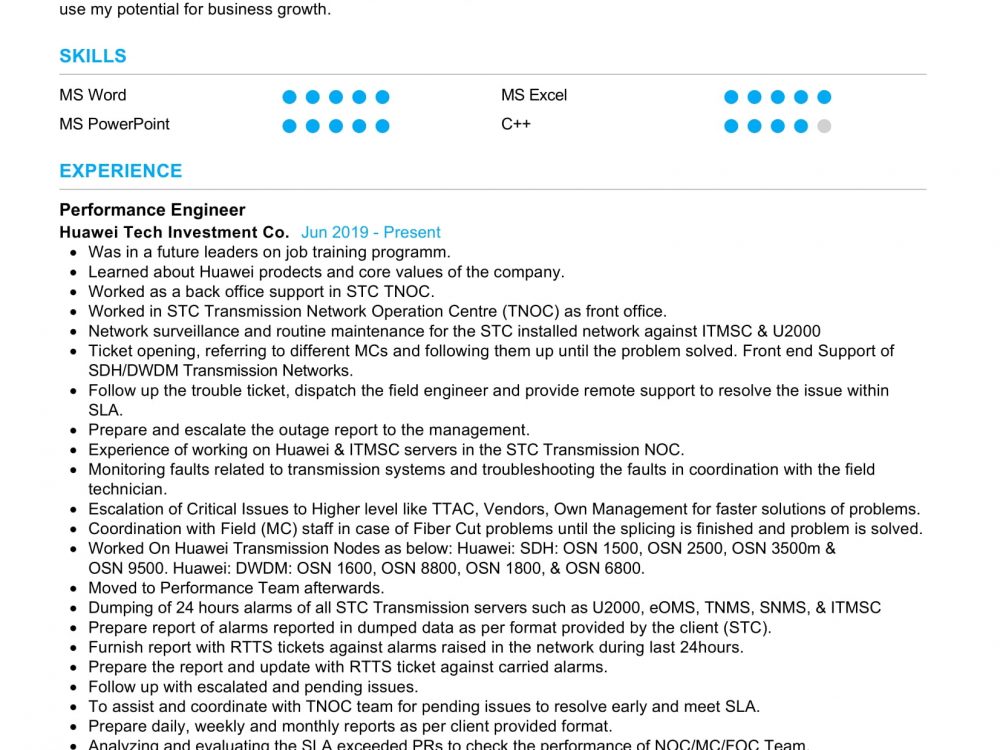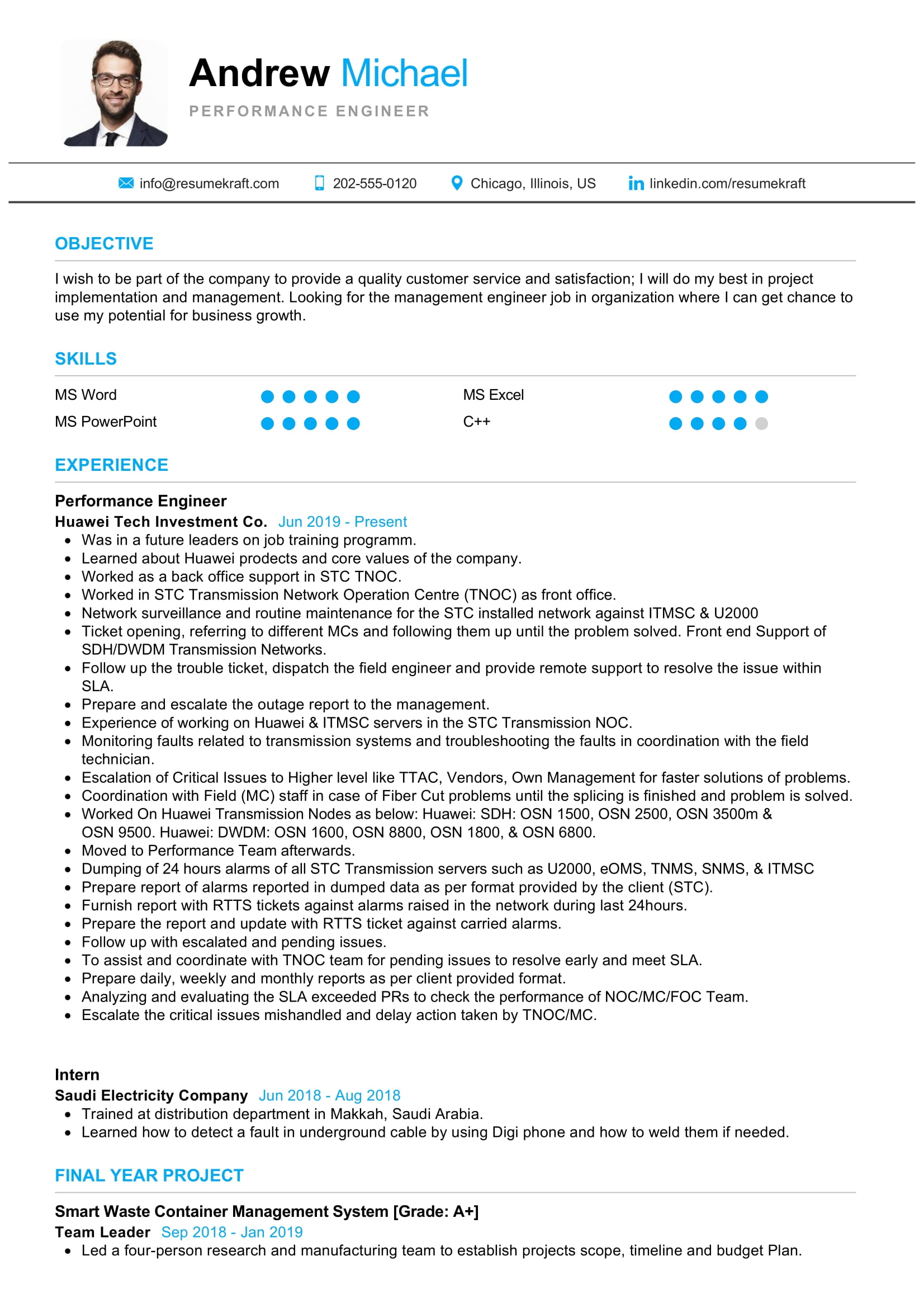What Should Be Included In A Performance Engineer Resume?
When writing a performance engineer resume, you need to ensure that all the relevant information is included. As a performance engineer, you are responsible for ensuring the performance of an organization’s systems and applications. Your resume should reflect your skill set and experience in this field.
First and foremost, include your professional summary. This section should provide an overview of your skills and experience, as well as highlight the value that you bring to potential employers. Be sure to include any certifications or training that you have received.
Next, list your work experience. Include any relevant positions that you have held, detailing your responsibilities and accomplishments. This section should focus on the technical aspects of your job, as well as any projects or initiatives you have overseen. Your technical skills are an important part of a performance engineer resume. List the tools and languages you are familiar with and any certifications or special training you have received.
Finally, include any education or awards that you have received. This may include a college degree or any special training or certifications that you have completed. By including all of these elements in your performance engineer resume, you can be sure to make a positive impression on potential employers. Make sure to review your resume several times and get feedback from a professional to ensure that it accurately reflects your skills and experience.
What Skills Should I Put On My Resume For Performance Engineer?
When it comes to creating a resume as a performance engineer, there are certain skills that you need to highlight in order to get the job of your dreams. A performance engineer is responsible for the proper functioning of an organization’s hardware and software systems. As such, the skills needed to be successful in this role are varied and require a great deal of technical expertise.
A performance engineer must have a thorough knowledge of the hardware and software systems being used, and must be able to identify and solve problems that arise. They need to have strong analytical and problem-solving skills in order to diagnose and troubleshoot complex issues. Additionally, experience with scripting and programming languages is a must as performance engineers often need to write scripts to automate tasks.
In terms of communication, a performance engineer should possess excellent verbal and written communication skills. This is essential when communicating with customers, coworkers, and other stakeholders. The ability to work in a team environment and collaborate with other professionals is also a must.
Finally, a performance engineer should have a deep understanding of IT security, data storage, and data analysis. Knowledge of cloud computing, DevOps, and other emerging technologies is also highly desirable. By emphasizing these skills on your resume, you will be sure to stand out from the competition and secure the job you want.
What Is The Job Description Of The Performance Engineer?
As a Performance Engineer, you have the important job of working to ensure the highest level of performance of a variety of technology solutions. This can include both hardware and software-based solutions. You will be responsible for building, deploying, and maintaining these solutions. This includes optimizing the performance of the solution and troubleshooting any issues. You must also be able to provide technical support to users when needed.
To excel in this role, you must have an in-depth knowledge of the technology used to build and maintain the solutions. You must also be able to analyze and interpret performance data. You must have excellent problem-solving skills and be able to work independently or as part of a team. Good communication skills are also essential as you will need to collaborate with other stakeholders on the project. It is also important that you stay up to date on the latest developments in the industry.
A successful Performance Engineer must have an understanding of the technologies used in the solutions they are working on, be able to analyze performance data, have problem-solving skills and good communication skills, and have an understanding of the latest developments in the industry. This is a critical role in any organization as the performance of the solutions deployed can make or break the success of the project. Writing a resume that accurately reflects your qualifications and experience as a Performance Engineer will be an important step in being considered for the job.
What Is A Good Objective For A Performance Engineer Resume?
.A strong objective statement is essential in any resume, and a performance engineer resume is no different. A performance engineer is responsible for optimizing computer systems and networks to ensure they are running smoothly and efficiently, so it is important that your resume highlights the skills and experience that make you the ideal candidate for the job. The objective statement should be the first thing a prospective employer reads, so it is important to make sure it is clear, concise, and relevant.
When writing the objective section of a performance engineer resume, it is important to highlight the core competencies you possess that will make you a successful performance engineer. This can include technical skills such as experience with computer hardware, software, and network infrastructure, as well as more general soft skills such as problem solving, communication, and organizational skills. Additionally, mentioning relevant experience, such as certifications held or software development you have completed, will demonstrate your expertise to prospective employers.
In addition to highlighting your skills and experience, the objective section of a performance engineer resume should also demonstrate your enthusiasm for the job. Make sure to emphasize your desire to help the company by providing the best possible performance to their computer systems and network. Explain how you can use your skills and experience to ensure the company’s systems are running optimally and any potential problems are identified and addressed quickly.
The objective section of a performance engineer resume should succinctly sum up your experience, skills, and enthusiasm for the job. It should be concise and should not be more than two sentences long. Above all, it should make it clear to prospective employers why you are the perfect fit for the job.
What Are The Career Prospects In The Performance Engineer?
Performance engineering is an essential part of any development process, as it’s responsible for ensuring that applications run as efficiently as possible. By using performance engineering, developers are able to identify potential issues and optimize their applications to run quickly and without any errors. As such, it’s an important role that requires a great amount of skill and knowledge.
Career prospects in the performance engineering field are vast, as it is an ever-growing field. Performance engineers can find jobs in many industries, from software development to automotive to financial services. Depending on the size of the organization, the job duties may range from making sure the application meets certain requirements to ensuring the application can be scaled to support large amounts of user traffic.
Performance engineers often work closely with software developers, system engineers, and database administrators to ensure that the application meets the requirements provided. It’s important for performance engineers to have a thorough understanding of the system, as they must be able to identify any potential problems and find the best solutions possible.
In order to be successful as a performance engineer, one must have excellent analytical and problem-solving skills, as well as an ability to quickly learn and understand new technologies. Additionally, experience in software development, system engineering, or database administration is also helpful. A senior sales manager who specializes in performance engineering will also have a competitive edge, as they will have a deep understanding of the customer’s needs and be able to provide the best solutions.
Overall, the demand for performance engineering is increasing, and the field is full of potential and opportunities. If you’re looking to enter this field, it’s important to have a strong understanding of the development process and the technologies that are used . Additionally, strong interpersonal skills are a must, as performance engineering requires working closely with other departments to solve problems and develop the best solutions possible.
Key Takeaways for an Senior Performance Engineer resume
- When creating an effective resume for a Senior Performance Engineer position, there are a few key takeaways to keep in mind. Firstly, the resume should be concise and provide relevant information to showcase your technical and analytical skills. Secondly, be sure to include any recent education or professional development that can help you stand out from the competition. Finally, it is important to highlight past performance engineering projects or accomplishments in order to show potential employers how you can be an asset to their team.
- When listing your technical and analytical skills, be sure to specify the types of technologies and systems you are familiar with. Additionally, list any certifications or experience that demonstrate your expertise in performance engineering. This could include any certifications from leading technology companies like Microsoft, Oracle, or IBM. It is also important to include metrics such as uptime and response time that demonstrate your success as a Performance Engineer.
- In addition to technical and analytical skills, it is important to include recent education or professional development in your resume. This could include any courses or workshops that you have taken to stay up to date on the latest performance engineering techniques. Additionally, be sure to highlight any achievements such as presentations or awards that you have received. This will demonstrate to potential employers that you are well-versed in the field and have the knowledge and expertise to be successful in the role.
- Finally, be sure to include your relevant performance engineering projects in your resume. This should include a list of projects that you have completed, and the process and results of each. This will show potential employers what you are capable of and how you can be a valuable asset to their team . By demonstrating your analytical skills, recent education or professional development, and relevant performance engineering projects, you can prove to employers that you have the necessary skills and experience to be successful in the role.



